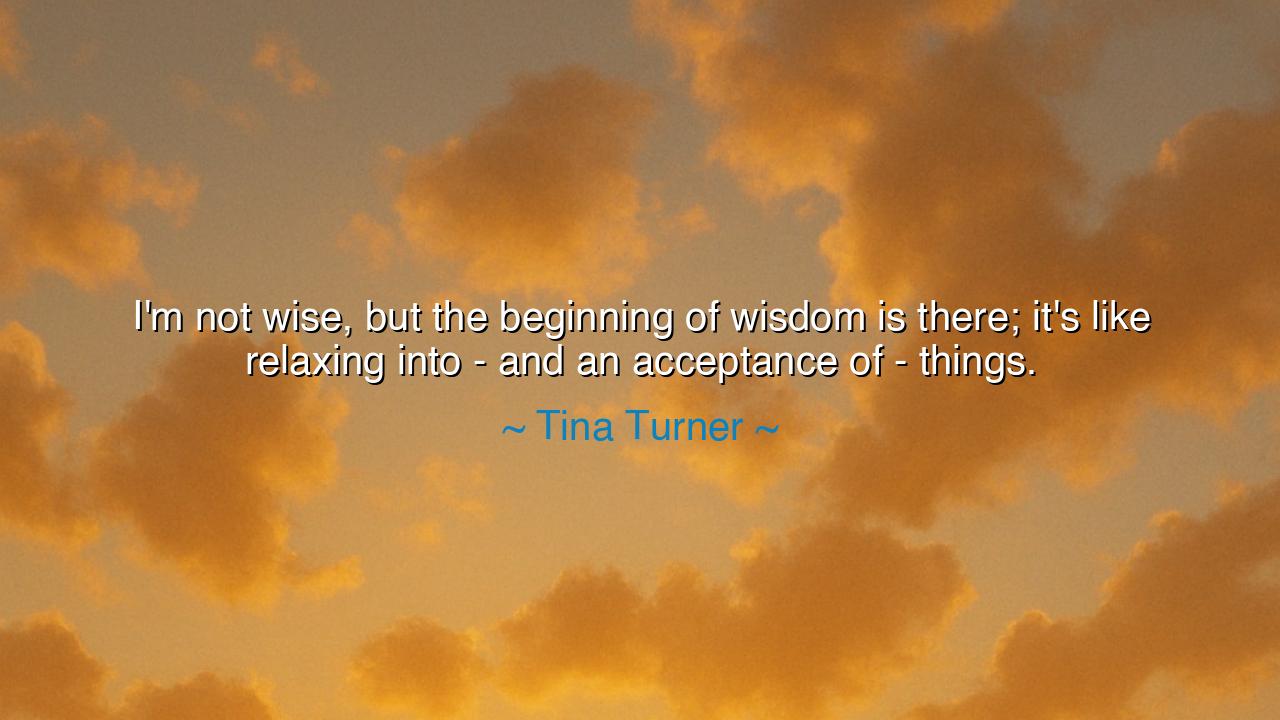
I'm not wise, but the beginning of wisdom is there; it's like
I'm not wise, but the beginning of wisdom is there; it's like relaxing into - and an acceptance of - things.






Hearken, children of the ages, to the reflective words of Tina Turner, who proclaimed: “I'm not wise, but the beginning of wisdom is there; it's like relaxing into—and an acceptance of—things.” In these words lies the eternal truth of humility, reflection, and the path toward understanding. Wisdom does not arrive fully formed; it begins in the quiet recognition of life’s currents, the surrender to what is beyond control, and the patient acceptance of reality.
Turner teaches that the inception of wisdom is found in acceptance. To fight constantly against the world, to resist circumstances and outcomes, is to expend energy without insight. The first step toward understanding is the ability to relax into the flow of life, to perceive without judgment, and to acknowledge both joy and hardship as integral to the human experience. In this surrender lies the seed of true discernment.
Consider the life of Nelson Mandela, whose long imprisonment and trials demanded the cultivation of acceptance before wisdom could emerge. Though initially filled with frustration and indignation, he gradually embraced patience, reflection, and understanding. From this place of acceptance arose a profound wisdom that guided his reconciliation efforts and leadership, illustrating Turner’s insight: wisdom begins in humility and the quiet yielding to truth.
The ancients themselves revered this principle. Lao Tzu, in the Tao Te Ching, taught that one must yield to the natural order to gain insight; the Stoics counseled acceptance of that which cannot be changed as a path to virtue. Turner’s reflection resonates with this timeless teaching: to acknowledge the limits of control and to accept the flow of life is the first doorway to wisdom, even before knowledge or judgment fully mature.
Thus, her counsel is both guidance and inspiration: recognize that wisdom is not an instant attainment, but a gradual flowering. Begin by relaxing into reality, observing without resistance, and allowing life’s lessons to shape understanding. In acceptance, the mind becomes receptive, the heart becomes steady, and the soul begins its ascent toward discernment.
Carry this teaching, children of generations yet unborn: cherish humility, embrace acceptance, and allow the beginning of wisdom to take root within you. Through this practice, even in youth or in times of trial, the path to understanding opens, guiding thought, action, and spirit toward clarity, peace, and enduring insight across the ages.






SLDAN SOAI LINH
This perspective feels refreshingly human because it doesn’t glorify wisdom as a perfected state. Turner emphasizes the process rather than the result. I’m curious how we can cultivate that sense of ‘relaxing into’ life in a society that rewards constant action and immediate results. Could embracing this approach actually make people more effective, resilient, and empathetic, even if it seems counterintuitive to traditional notions of success?
CLCan Long
I’m intrigued by how Tina Turner frames the start of wisdom as acceptance. It seems to suggest that real understanding begins when we stop fighting reality and start observing it openly. Could this be why experience often brings clarity? I’d like to explore how this principle applies to challenges, failures, or setbacks. Maybe true wisdom doesn’t prevent difficulties but helps us respond to them with composure and insight.
HLNGUYEN HOA LY
This quote makes me consider how much of life’s wisdom comes from emotional intelligence rather than factual knowledge. ‘Relaxing into’ things feels like an art form, one that requires trust in life’s flow and patience with oneself. I wonder if modern culture, which often prioritizes control and achievement, makes it difficult for people to access this kind of foundational wisdom. Could mindfulness and reflection be the key to this approach?
ATNguyen Pham Anh Thu
What strikes me is the humility in this reflection. Tina Turner admits she’s not wise, yet she recognizes the early stages of wisdom in acceptance. How do we distinguish between genuine acceptance and mere resignation? Maybe the essence of wisdom is learning to balance acknowledging life’s realities with the ongoing desire to grow and understand. It raises questions about the difference between surrender and passivity.
ATThao Anh Trinh
I find this statement comforting and relatable. It seems to suggest that acknowledging our limitations and imperfections is part of gaining insight. Could the beginning of wisdom really be found in patience and acceptance rather than achievement or intellect? I’m curious how this mindset could affect everyday decision-making. Perhaps the quieter, reflective approach Tina describes allows for deeper clarity than constant striving ever could.